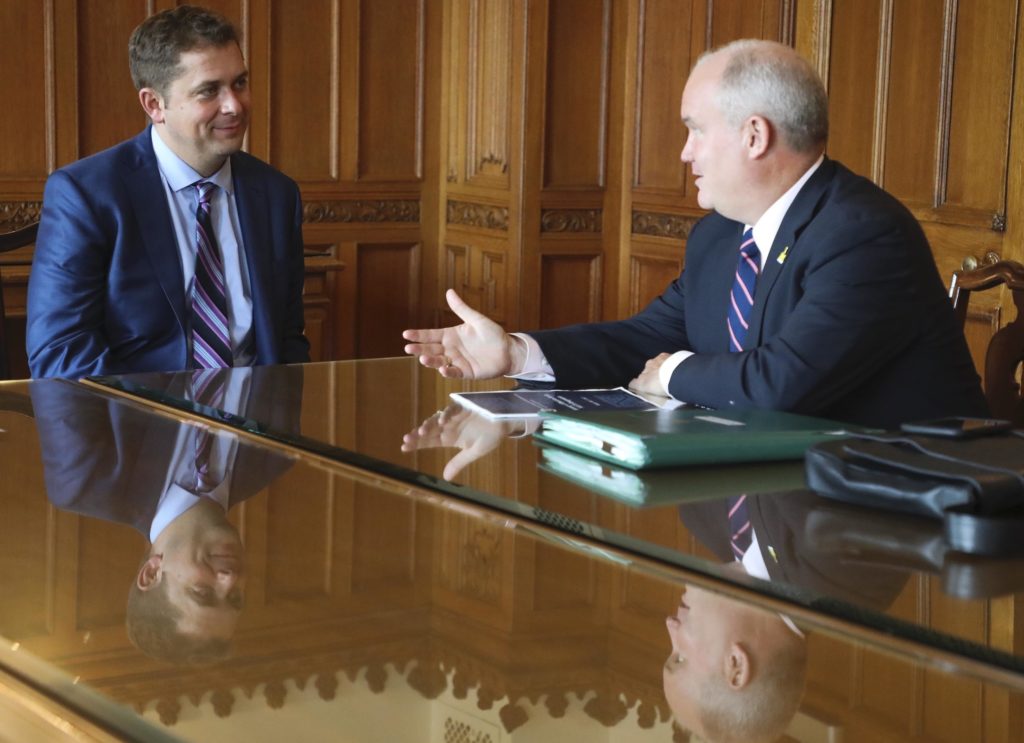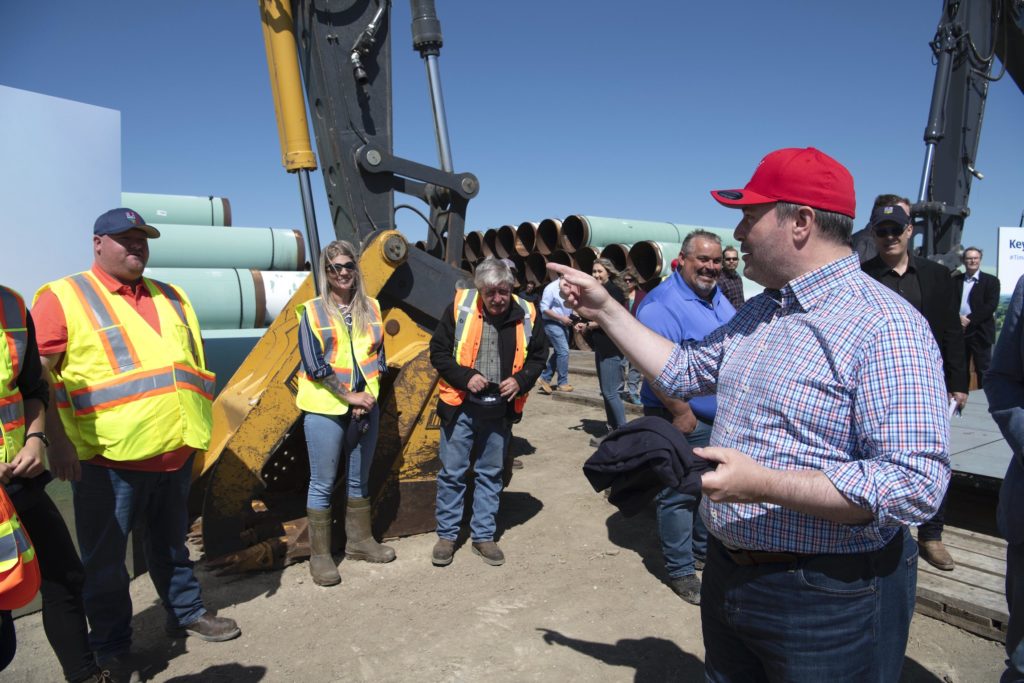
The federal government ‘sees a long-term future for the oilsands.’ Here’s what you need to know
An internal document obtained by The Narwhal shows how the natural resources minister was briefed...
In his acceptance speech in the early hours of Monday morning, new federal Conservative Leader Erin O’Toole promised his party would be ready for an election as early as this fall. What he didn’t say is that the party’s fate in a federal contest could hinge at least in part on a plan to combat climate change.
“If Conservatives want to win another national government they are going to have to find ways to win critical seats in the suburban belt around Toronto – the 905,” Ken Boessenkool, a former senior advisor to Stephen Harper, wrote in Maclean’s back in February.
Boessenkool pointed to a Leger poll sponsored by non-profit Clean Prosperity, which found climate change was the top issue for swing voters in the 905 considering the Conservative Party in the 2019 election. While the Conservatives have held O’Toole’s Durham riding since 2004, several other ridings in the Greater Toronto Area were key battlegrounds last year.
The online survey of 3,013 respondents in the region surrounding Toronto found 28 per cent of voters who did not vote Conservative, but are either likely to or would consider voting Conservative, would be “more likely to support the party if it had a more credible climate plan, while only 11 per cent said they’d be less likely.”
“This suggests that one path for the Conservative Party in the 905: to make climate change a higher priority, and to present a plan to do so,” Boessenkool wrote.
While the COVID-19 pandemic and ensuing economic crisis have since taken hold, climate change remains a top concern for many Canadians.
“Our data suggests even today that the same number of people say climate change is a crisis that did prior to the pandemic and I don’t think this issue is going away,” David Coletto, CEO of Abacus Data, said in an interview with The Narwhal.
The challenge for the new Conservative leader is “how do you at once speak to the fears and anxieties of people living in oil-producing parts of the country, while at the same time, make appeals to Quebec and large parts of Ontario that don’t rely on that industry for their well-being and in fact believe we need to be moving faster away from it,” Coletto said.
“In a way, the Conservative Party is probably the best able to do that if it really wants to because it has a level of trust and an affinity with Canadians who live in those regions,” he said.
O’Toole has been a member of Parliament since 2012 but as a new leader, and a relatively unknown entity outside of Ottawa, he has an opportunity to introduce himself to voters. On climate change, Coletto said it will be important for O’Toole to do what former leader Andrew Scheer couldn’t: convince Canadians it’s an issue he cares about.
“We can as a country debate which policies are going to best get us there, but if at the start people don’t feel he’s committed to solving the problem, then nothing he says, no policy he puts forward, is going to be taken seriously,” Coletto said.

Experts say Erin O’Toole will need to put forward a stronger climate plan than predecessor Andrew Scheer if he wants to win over swing voters. Photo: Andrew Scheer / Flickr
O’Toole, who framed himself as the “true blue” candidate in the leadership race, is so far toeing the party line of the last election and vowing to “fight the carbon tax with every last breath” — at least when it comes to the Liberals’ broad-based tax as it applies to individuals.
The tax has been a major source of contention between the federal government and several provinces, including Alberta, Saskatchewan and Ontario, each of which went to court to argue that Ottawa is acting outside its jurisdiction.
While O’Toole opposes a carbon tax, he does call for a price on industrial pollution.
O’Toole has promised to build a climate policy that uses market-based principles to incentivize economic change and invests in mitigation to protect communities while making industry — rather than individual Canadians — foot the bill for emissions.
“If provinces want to use market mechanisms, other forms of carbon pricing, or regulatory measures, that is up to them. The federal government will be there to support them,” his platform reads.
At the same time, he says Canada has the potential to help lower greenhouse gas emissions globally by exporting nuclear technology and liquefied natural gas and investing in carbon capture and storage. He did not, however, include any specific emissions-reduction targets or commit to upholding Canada’s existing pledges.
O’Toole’s platform points to the potential of conservation initiatives, including incentivizing landowners to protect lands that play a critical role in sequestering carbon.
The Narwhal requested an interview with O’Toole but was told the new leader would not be available before publication.
O’Toole, who was endorsed by Alberta Premier Jason Kenney in the leadership race, has made it clear that a Conservative government would continue to support the oil and gas sector while working with industry to develop a plan to reach net-zero emissions.
Kenney’s backing was seen as a significant boost for O’Toole, but it could make it more difficult for the new leader to implement robust environmental policies.
“Right now, standing up for Alberta, to many Albertans, is basically equivalent to not fighting hard to transition away from the fossil fuel industry,” Coletto said.

Alberta Premier Jason Kenney greets workers in Oyen, Alta., on July 3, after announcing the provincial government’s financial support of Keystone XL. Photo: Chris Schwarz / Government of Alberta / Flickr
O’Toole committed in his leadership platform to repeal Bill C-69 (the bill that enacted both the Impact Assessment Act and the Canadian Energy Regulator Act), pass a National Strategic Pipelines Act that would speed up environmental reviews for projects deemed “nationally strategic” and scrap the tanker ban on B.C.’s north coast — an environmental protection measure that was seen to play a role in the death of the Enbridge Northern Gateway pipeline project in 2016.
O’Toole, who was highly critical of blockades set up across the country last winter in support of Wet’suwet’en land defenders opposed to the Coastal GasLink pipeline, has also said he would criminalize rail blockades.
His Freedom of Movement Act would make it illegal to block a railway, airport, port or the entrance to a business or household “to prevent radicals from shutting down the economy.” That echoes a law enacted by Kenney’s United Conservative Party government in June — legislation that is now facing a constitutional challenge.
On Indigenous rights, O’Toole said he doesn’t support legislation to fully implement the United Nations Declarations on the Rights of Indigenous Peoples.
Speaking to Assembly of First Nations National Chief Perry Bellegarde on his Ahkameyimok Podcast earlier this month, O’Toole said: “I’m not a fan of UNDRIP and here’s the reason: our Supreme Court of Canada developed the duty to consult and Indigenous engagement far before the UN did any work on this topic and I’m a bit of a UN reform-minded person.”
“I don’t want us waiting for somebody in New York to say we need to do better and we need better outcomes in terms of reconciliation,” he said.
In his platform, O’Toole says, “improving the relationship between the government and Indigenous communities must be a top priority.”
He says a Conservative government under his leadership would promote economic development for Indigenous peoples by holding a summit aimed at increasing the benefits and revenues Indigenous communities get from resource development.
O’Toole also commits to “break the logjam holding back land claim settlements and agreements on land title issues across Canada.”
Sarah Burch, the Canada research chair in sustainability governance and innovation based at the University of Waterloo, said she’s “heartened” to see O’Toole acknowledge the urgent challenge the world is facing due to climate change.
But she is concerned about a number of the new leader’s platform planks — including O’Toole’s promotion of LNG as an alternative to coal.
O’Toole’s platform says, “we need to stop building new coal-fired power plants and accept that natural gas is the most realistic interim step that cuts emissions in half.”
While Burch said the combustion of natural gas may produce about half the emissions of coal combustion, that doesn’t consider the lifecycle emissions from the production and transportation of natural gas, which releases methane, a much more powerful greenhouse gas than carbon dioxide.
“Unless we grapple with the lifecycle emissions of natural gas and deal with methane fugitive emissions, it’s not going to be a huge improvement. And even more important in my mind is that it also then locks us into decades of still a fairly high carbon energy system,” she said.
As for his commitment to scrap the carbon tax, Burch said she appreciates that O’Toole’s focus is on reducing pollution from industrial sources and ensuring those responsible pay for their emissions. But she doesn’t think Canada will be able to reach its goals without consumers being part of the equation.
“That’s part of what a carbon tax does,” she said.
Burch added that she’s surprised O’Toole didn’t emphasize the potential to produce renewable energy in Canada.
“Alberta in particular is well endowed with renewable energy resources,” she said. “There’s so much potential there that could really fuel or power a renewable or lower carbon energy transition in Canada and could create good, well-paying jobs, but he dismisses those pretty much outright as not a feasible or desirable solution.”
At this early stage, there remains a level of uncertainty about what climate policies O’Toole’s Conservative Party will prioritize.
Andrew Leach, an energy and environmental economist at the University of Alberta, said “the platform that he ran on … was the vision to become leader of the party and what matters to all of us is what he would do as prime minister.”
Leach did caution, though, that it’s the “jerk back and forth” on climate policies that can be really costly for the economy.
You don’t want one government to commit to phasing out coal, the next government to say “oh, just kidding” and a third government to flip back to phasing out coal, he explained.
“If we have broad agreement about where Canada is heading and differences about the nuts and bolts of getting there in terms of greenhouse gas emissions then we’re probably going to have better and more cost-effective environmental policy,” he said.
Get the inside scoop on The Narwhal’s environment and climate reporting by signing up for our free newsletter. On March 17, federal Conservative Leader Pierre Poilievre...
Continue reading
An internal document obtained by The Narwhal shows how the natural resources minister was briefed...

Notes made by regulator officers during thousands of inspections that were marked in compliance with...

Racing against time, dwindling habitat and warming waters, scientists are trying to give this little-known...
